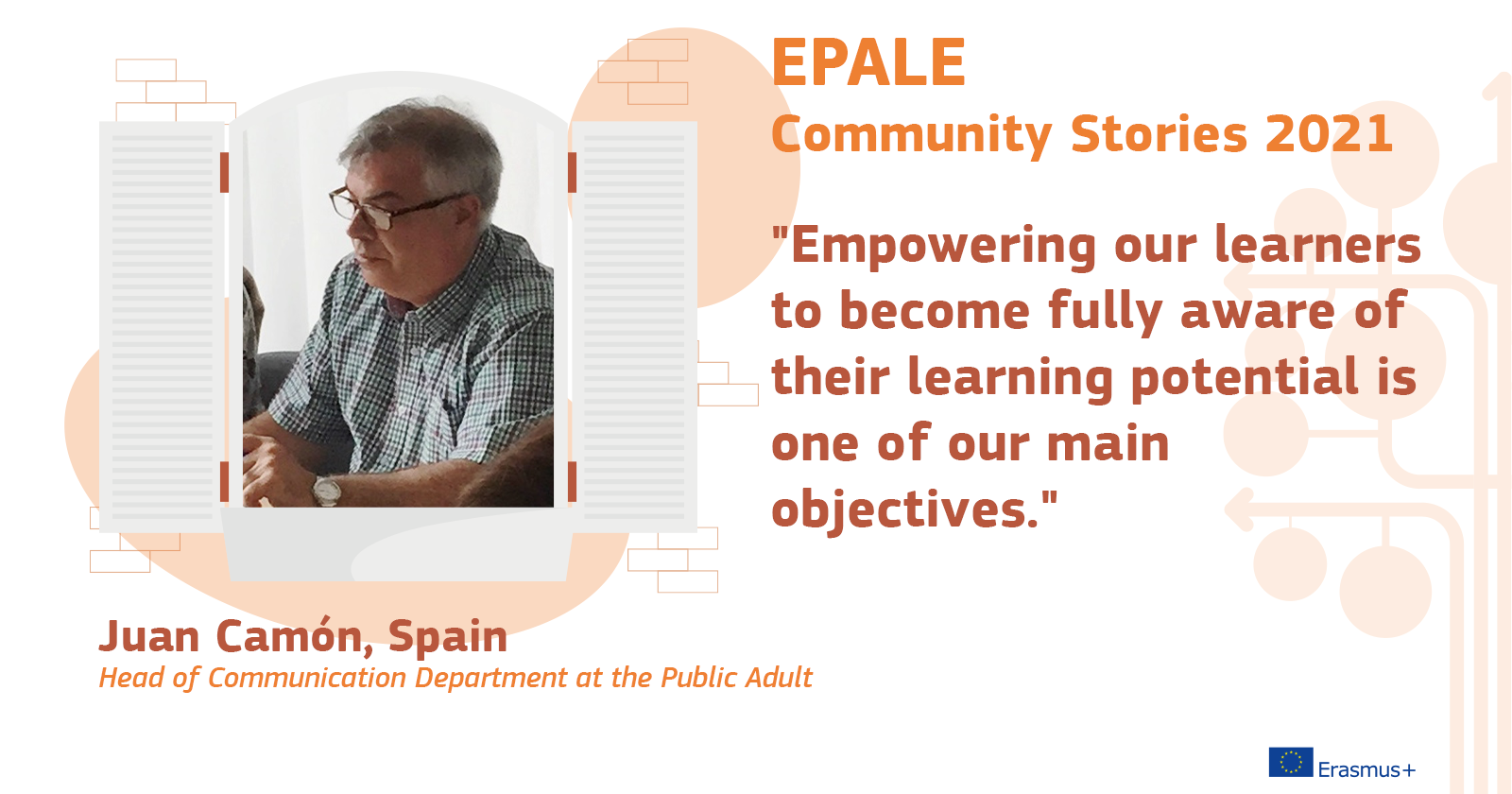Juan Camón: showing students their action potential as European citizens

Short bio
My name is Juan Camón and I have been Head of Communication Department at the Public Adult Training center CEA Lorca since 2008. I am a tenured Professor of English as a Foreign language (Secondary School Level), with teaching experience as an associate lecturer at the University Pompeu Fabra in Barcelona, UPV in Vitoria (Basque country), and Murcia University (UMU) from 2006 to 2012. I am a teacher trainer in the Murcia Ed. Department.
My EPALE
The thematic fields from the Community Stories Initiative are well aligned with our work as adult trainers. Empowering our learners to become fully aware of their learning potential is one of our main objectives. Making our training and our institution sustainable is also a pillar of our work, together with making our teaching practice more inclusive with each academic year. Last but not least, making full use of blended learning and digital resources is providing a boost both in the learning outcomes of our adult learners and among our trainers.
My Story
The European Parliament Ambassador School Programme (EPAS) was born in 2010 in The Netherlands when the European Parliament Information Office in The Hague started this educational programme. Their enthusiasm became contagious and The European Parliament Liaison Offices (EPLOs) in Poland, Germany, Italy, France, Spain and Ireland started implementing this program. For the 2021-2022 academic year, more than 300 schools applied. Only 125 educational centers were selected as Ambassador Schools. The Public Adult Training Center based in Lorca (acronym in Spanish CEA), is the only Adult Training Center in Spain to be on the list of admitted institutions for this current academic year.
This Program aims to create a permanently increasing network of schools across the European Union that are engaged with European Parliament activities and committed to promoting European citizenship and values. This network intends to show pupils in secondary schools and also in VET institutions what the European Parliament is, what it stands for, and how students can actively participate in the EU's democratic processes.
Being a selected Ambassador School of the European Parliament is not easy. The school must meet a series of requirements, and make sure its characteristics stand out from the rest. Above all, the school must show its interest and trajectory in promoting international programs. The CEA Lorca Ambassador team is made up of 40 junior ambassadors of the European Parliament (ESPA students), and 4 senior ambassadors, professors from the Geography and the Communication departments. However, this is not a project that only seeks to disseminate data about the EU. Above all it seeks to show students their action potential as European citizens. We are committed to creating an information point on Europe in our adult center.
Four teachers from the History and Languages Department at The Adult Training Center Alto Guadalentín coordinate the activities of the 40 registered students. The outreach activities at CEA Alto Guadalentín include online debates with MEPs who explained their work in the various parliamentary committees in which they participate. Karim Hallal Peche, an analyst and disseminator of European policies, participated in a videoconference with our learners on April 13th. He demonstrated to the groups of student ambassadors of CEA Alto Guadalentín that the European Union, and everything that surrounds it, does not have to be boring. From his YouTube channel he disseminates what the European Union does. Ambassador schools in this network work electronically to exchange information and coordinate awareness-raising activities regarding Parliamentary democracy and the values of European citizenship.
As an example, on February 11th we celebrated Women in Science Day and the #NoMoreMatildas campaign run by the Association of Women Researchers and Technologies (AMIT). This campaign seeks to denounce the consequences of the "Matilda Effect" in order to recover scientific references to inspire and promote scientific vocations in adolescents.
In order to involve the students and encourage their participation in developing the project, we propose activities in a transversal way to prevent students from perceiving the contents about the EU as "just another subject". To widen the access of the school community to the content of the EPAS project we asked the other education departments to join in, hence making this project more transversal as well as promoting synergy.
CEA teachers particularly value interactions with MEPs and the fact that being part of this European network of schools is helping to consolidate a feeling of European citizenship in our educational community. This alone more than justifies the shared effort of the teachers and adult learners of CEA Alto Guadalentín.




